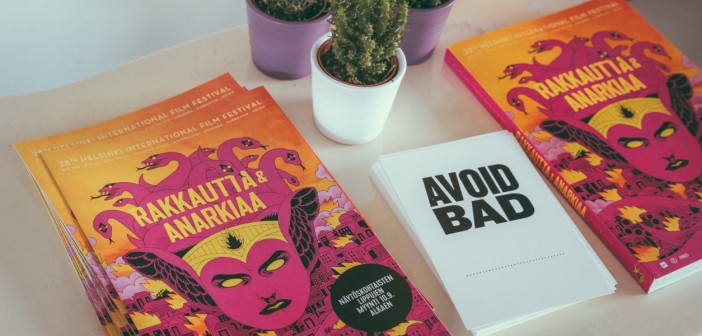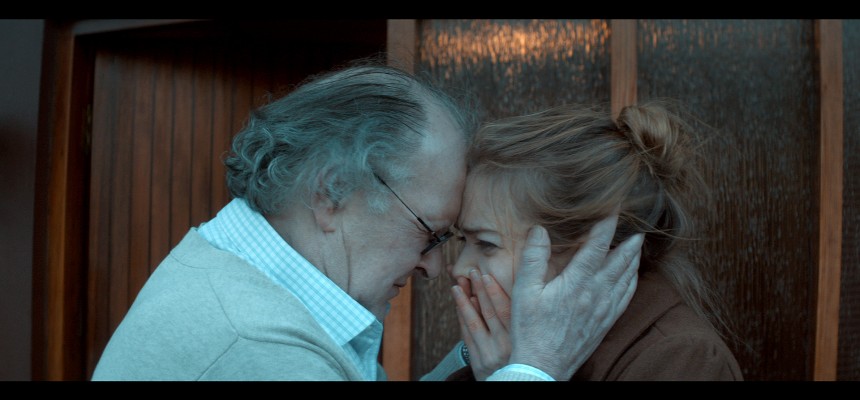Established in 1988, 15 years after the Lina Wertmuller film about a botched attempt on Mussolini’s life which gives it its name, the Helsinki International Film Festival (HIFF) claims to ‘promote the artistry of filmmaking alongside inventive, controversial and visually stunning new films’ as well as ‘to screen films that would otherwise not be seen in Finnish theatres’. Running over 11 days on 12 different screens, including the now-defunct downtown Bio Rex cinema which used to be the centre of arthouse cinema in Helsinki, it had 61,000 visitors this year, and featured a wide range of new releases, and its guests have included John Woo, Tilda Swinton and, er, Baz Luhrmann. For some reason this year’s opening film, Louder than Bombs, an English language debut by Norwegian director Joachim Trier, who made the well-regarded Oslo August 31st, with Gabriel Byre and Isabelle Huppert, who plays a war photographer, also a special presentation at the more prestigious and US-dominated Toronto Film festival, was off-limits to media, who had to settle for the abysmal Sicario.
This film, which recently opened in Australia, after breaking box office records in the US, is the second Hollywood effort by French Canadian director Denis Villeneuve, who made the brilliant Middle East drama Incendies in 2010, as well as other award-winning Canadian films, but since being drafted into Hollywood, has produced only the mediocre Prisoners, with Hugh Jackman and Jake Gyllenhal, and now this gung ho, shoot-em-up action movie set amidst drug cartels in Mexico. Both films have cinematography by ace British cameraman Roger Deakins, the Coen brothers’ main collaborator, and music by Icelandic composer Jóhann Jóhansson, which only adds to the sense of criminally wasted talent. Jóhansson’s music consists of obviously ominous rumbles, while Deakins has little chance to shine in a benighted Mexico consisting of Neanderthal villains, dusty traffic jams, dark tunnels and prosperous drug barons. Emily Blunt, playing the sole woman in sight, a rookie FBI fall guy, is asked jokingly for a password to enter a room full of boorish blokes. ‘Moron’, she says, which sums up the entire film, where Benicio del Toro is also wasted as the eponymous hitman. (Sicario is also an Italian word for hired killer, seemingly named after a small village in Sicily, but the film claims the word has its origins in Jerusalem.) Villeneuve is now at work with Deakins on a redundant sequel to Blade Runner – one can only speculate on what he could have achieved if only he’d stayed in Canada, or moved to France.
After Sicario, things could only get better, and this was aided by a website called Festivalscope where one can access streamings of selected films online, with no Hollywood dreck, which also means you don’t even need to be physically present at the festival. The small scale Bulgarian film The Lesson was one of my favourites, one of three films selected for the LUX prize by the European parliament, directed by Kristina Grozeva and Petar Valchanov. It stars Margita Gosheva in a beautifully measured performance as a hard-working small town English teacher coping with a classroom thief as well as the foreclosure of her house which her wastrel husband has caused through his dysfunctional campervan. After a stalemate feud with her wealthy philandering father, and a sordid encounter with a loan shark, she finally dons a stocking mask and resorts to bank robbery. In a very anti-Hollywood ellipsis, we don’t even see the robbery, but she presents the results of it to the loan shark. A co-production with Greece, it also won the Ingmar Bergman International Debut Award at the Gothenburg Film Festival as well as awards at San Sebastian and Warsaw. Whether that means we will ever see it here, who knows?
I was grateful for the chance to see Carol Morley’s The Falling which has music by Tracey Thorn, formerly of Everything But the Girl, who incidentally has a fascinating book out about singing entitled Naked at the Albert Hall. Dealing with a fainting epidemic in an English girls’ school in 1969 after the death of the charismatic Abbie Mortimer, it has Greta Scacchi as a severe headmistress and Maxine Peake as the beehived mother of Abbie’s best friend Lydia. There are a couple of moments of bathos (after Lydia’s mother catches her having sex with her brother Lydia says she ‘forgot’ he was her brother, and the former then reveals Lydia’s father ‘came from the shadows’), but it’s an engaging film which will hopefully get a screening here.
Life in A Fishbowl
A couple of Icelandic films were also hugely enjoyable – Baldvin Zophoníasson’s Life in a Fishbowl has already won a slew of Edda Awards in its home country and is this year’s Icelandic entry for the Academy Awards’ tokenistic international category of Best Foreign Film. It deals with three separate groups of people who are linked vicariously in a pre-economic crisis Reykjavík where Eik (a lovely performance by Hera Hilmarsdóttir), a young kindergarten teacher who has to resort to prostitution to support her diabetic daughter, whom she also has to protect from her abusive grandfather, encounters Móri (Þorsteinn Bachmann), a well-known poet and land-owning author who chooses to live the life of a wino and tramp, on the street. She also meets Sölvi, an ex-footballer now working for a dodgy bank, whose daughter is at her kndergarten, on a decadent weekend in Florida. Written by Birgir Örn of the band Maus, the film’s English title comes from a track by the band – it was originally called ‘Vonarstræti’ [‘Hope Street’] for its Icelandic release – while two of Móri’s books are named after tracks by Maus’ singer-guitarist Siggi. A Finnish-Swedish-Czech-Icelandic co-production, it was the highest-earning film in Iceland in 2014, ahead of ‘international’ blockbusters such as The Hobbit. It features delightful group of off-beat characters from all walks of life, with some effective melodic music by Olafur Arnalds, and was shown here earlier this year in the Scandinavian Film Festival.
Also part of that festival was Hafsteinn Gunnar Sigurðsson’s Paris of the North, set in Flateyri, a small former fishing village in the Western Fjords, where Hugi works as a primary school teacher, having fled from Reykjavík to dry out with the local three-man A.A., indulge in jogging and learn Portuguese to keep up with his ex who has abandoned him over there. He also plays football with one of his pupils, a solitary would-be goalkeeper who is also the son of his local ex-girlfriend. Then his peaceful existence is disrupted by his aging, hard-drinking father, returning from Thailand, played by rock singer Helgi Bjornsson, who even steals his local ex. Inevitably, Hugi is forced to leave town, while his father stays on after a heart attack. With engaging music by Prins Polo of the alternative rock band Skakkamanage, and featuring the spectacular mountain Þorfinnur, it’s another refreshingly ‘small’ film. Sigurðsson’s delightful debut film about a couple of road workers, Either Way (2011), also set in a remote part of Iceland, was subjected to a 2014 US remake which slavishly copies the original, called ‘Prince Avalanche’ by David Gordon Green, set in a remote part of Texas after a forest fire, with music by Explosions in the Sky, but hopefully the idiosyncracies of this film, its setting and its characters will pre-empt another remake.
Nominated for the 2015 Nordic Council Film Prize is Fusi – which has the rather gauche English title Virgin Mountain – the name of a 43 year old overweight man still living with his mother in Reykjavík, who is persuaded to go along to line-dancing classes and meets Aima, a woman of a certain age. Written and directed by Dagur Kári, who made the excellent Noi the Albino (2003), all seems to be going well, and the couple are about to move in together when Aima has second thoughts. It has an excellent performance by Gunnar Jónsson in the lead role, for which he won Best Actor Award at the New York Tribeca Film Festival, while Kári won Best Screenplay, and the film won Best Narrative Feature. Other entries for the Nordic Council Film Prize – announced in Reykjavík at the end of October – are Silent Heart, by veteran Danish director Bille August, the Swedish film Gentlemen, about a novelist, a boxer and jazz pianist, and a drunken political agitator who is the novelist’s brother.
Then there’s Norway’s Out of Nature, the stream of consciousness of a man alone on a hiking trip in the mountains, and the Finnish They Have Escaped, directed by Jukka-Pekka Valkeapää, a bizarre road movie about a young couple who escape from a juvenile detention centre and end up in a horror scenario where they are locked underground in cages by fascist tormentors, and then released into police custody. Last year’s winner of the Nordic prize was the hilarious Icelandic comedy Of Horses and Men, another ‘small film’ with a second and third-string crew caused by the fact that a couple of Hollywood blockbusters filmed in the then-cheaply fashionable Iceland had snaffled up all the top Icelandic technicians. Whether an Icelandic film can win the award again is a moot point – it was first won in 2002 by Aki Kaurismäki’s Man Without a Past, and by Lars Von Trier’s Antichrist in 2009, and otherwise by exclusively Danish or Swedish films.
My visit to Love and Anarchy was unfortunately cut short, but it is certainly a festival worth keeping an eye on if you happen to be in this part of the world in late September.





